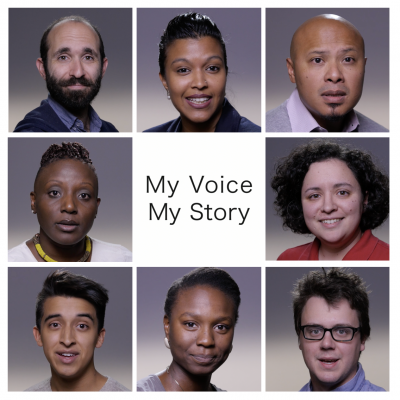Using Stories Toward Greater Inclusion

By Katya Hrichak
“Our identities affect how we experience the world around us and how others perceive us,” said Sara Xayarath Hernández, associate dean for inclusion and student engagement and co-facilitator of the Feb. 20 My Voice, My Story (MVMS) session. “Whenever we look at or engage with someone, we make multiple assumptions about their identities and experiences based on our perceptions of them. However, perceptions are not always accurate, not all identities are obvious, and everyone is susceptible to the negative implications of implicit bias.”
The MVMS sessions pair video monologues – constructed from real experiences of Cornell graduate and professional degree students – with facilitated dialogue. The stories shared are ones that frequently go untold. The program uses these stories as a means of generating understanding and empathy, and to identify factors that negatively influence the climate experienced by students. Through the facilitated dialogue, participants also have the opportunity to develop and share strategies on how to create more inclusive and supportive research and learning environments.
“Overall, our objectives are to raise awareness around breadth and depth of lived experiences of the graduate and professional student community, and develop a shared understanding of some of the issues experienced by graduate and professional students,” said Colleen McLinn, MVMS co-facilitator and executive director of the Cornell Center for the Integration of Research, Teaching, and Learning (CIRTL at Cornell). “We want to bring to the forefront some of those stories.”
One of the video monologues, inspired by an authentic graduate student experience, told the story of a character named Will. At his undergraduate institution, Will decided to disclose his struggles with depression and anxiety and take a leave of absence, only to find that other students then treated him differently.
When starting graduate school, Will opted not to disclose to others details on his challenges managing a mental illness because he did not want his faculty, his peers, and future colleagues to think he could not handle pressure or stress. However, this makes Will’s time in graduate school more challenging, as he feels he cannot be himself and is not comfortable accessing the resources he needs to be most successful.
Through small and large group discussions, MVMS participants representing 20 graduate fields and offices had to explore their own perceptions of the characters presented and imagine others’ perceptions as well. Once participants had the opportunity to look at a situation from all sides, they developed strategies to help students like Will who are struggling in silence, and to influence systemic changes leading to a more positive climate.
“Stories are powerful and are a great way to shed light on and encourage reflection on the range of issues that were brought up in this series,” said Jai Sweet, senior director of student development and academic services at the College of Veterinary Medicine. “We would like to roll it out to the entire Doctor of Veterinary Medicine student body starting with the incoming class in the fall. I attended the MVMS session to see how we could incorporate [the messages and strategies] into our ongoing discussions of climate and wellbeing at the College of Veterinary Medicine.”
“By discussing the lived experiences of graduate and professional students, we become more equipped to support all members of our campus community,” said Barbara A. Knuth, dean of the Graduate School. “We are inspired by the number of participants who have already attended this program and what it will mean for inclusion at Cornell going forward.”
The MVMS project was developed with the Cornell Interactive Theatre Ensemble through a collaboration of the Graduate School, CIRTL at Cornell, College of Engineering, School of Computing and Information Science, College of Veterinary Medicine, College of Agriculture and Life Sciences, and the College of Human Ecology. The ongoing advancement of this initiative is led by the Graduate School Office of Inclusion and Student Engagement and CIRTL at Cornell, and is supported by the National Science Foundation under Grant No. 1647094 (AGEP CIRTL), and the ETS/CGS Award for Innovation in Promoting Success in Graduate Education.
The Graduate School invites graduate fields to encourage their faculty, staff, and students to participate in future MVMS sessions to make strides towards a more inclusive climate. Contact Hernández (sh267@cornell.edu) or McLinn (cmm252@cornell.edu) or visit the Graduate School MVMS webpage for more information or to schedule a MVMS session.
Katya Hrichak is a communications assistant in the Graduate School.
